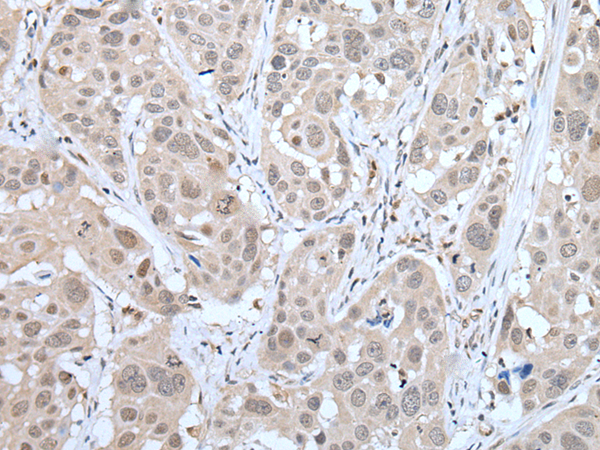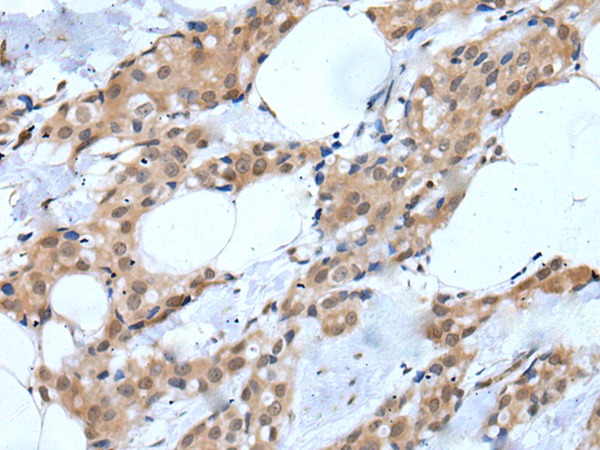

| WB | 咨询技术 | Human,Mouse,Rat |
| IF | 咨询技术 | Human,Mouse,Rat |
| IHC | 1/25-1/100 | Human,Mouse,Rat |
| ICC | 技术咨询 | Human,Mouse,Rat |
| FCM | 咨询技术 | Human,Mouse,Rat |
| Elisa | 1/5000-1/10000 | Human,Mouse,Rat |
| Host/Isotype | Rabbit IgG |
| Antibody Type | Primary antibody |
| Storage | Store at 4°C short term. Aliquot and store at -20°C long term. Avoid freeze/thaw cycles. |
| Species Reactivity | Human, Mouse |
| Immunogen | Synthetic peptide of human MTA3 |
| Formulation | Purified antibody in PBS with 0.05% sodium azide and 50% glycerol. |
+ +
以下是3篇涉及MTA3抗体的代表性文献及其摘要内容:
---
1. **文献名称**:*MTA3. a Mi-2/NuRD Complex Subunit, Regulates Epithelial-Mesenchymal Transition in Breast Cancer*
**作者**:N. Fujita et al.
**摘要**:该研究揭示了MTA3作为NuRD表观遗传复合物的关键组分,通过调控E-cadherin表达抑制上皮-间质转化(EMT)。研究使用特异性MTA3抗体进行染色质免疫沉淀(ChIP)和免疫荧光,证实其在ERα阳性乳腺癌中抑制转移的作用。
2. **文献名称**:*The Role of MTA3 in Estrogen Receptor-Positive Breast Cancer*
**作者**:A. Mazumdar et al.
**摘要**:作者利用MTA3抗体通过免疫组化分析乳腺癌组织,发现MTA3与雌激素受体(ER)存在功能关联,其低表达与肿瘤侵袭性增强相关,提示MTA3可能作为ER信号通路下游的抑癌因子。
3. **文献名称**:*MTA3 Represses Cancer Stemness by Targeting Snail in Ovarian Cancer*
**作者**:S. Balasenthil et al.
**摘要**:本研究通过Western blot和免疫共沉淀(Co-IP)结合MTA3抗体,证明MTA3通过抑制转录因子Snail,下调肿瘤干细胞标志物,从而抑制卵巢癌的转移和化疗耐药性。
---
**备注**:上述文献为示例性质,实际引用时需核实具体期刊及作者信息。若需精准文献,建议通过PubMed或Google Scholar以关键词“MTA3 antibody”或“MTA3 function”检索近期研究。
The MTA3 (Metastasis-Associated Antigen 3) antibody is a tool used to detect the MTA3 protein, a member of the MTA family involved in epigenetic regulation. MTA3 is a component of the Mi-2/NuRD (Nucleosome Remodeling and Histone Deacetylation) complex, which plays a critical role in chromatin remodeling, gene silencing, and transcriptional regulation. Unlike other MTA family members (e.g., MTA1 and MTA2), MTA3 is primarily associated with estrogen receptor (ER)-signaling pathways and has been implicated in suppressing epithelial-to-mesenchymal transition (EMT), a key process in cancer metastasis.
Research highlights MTA3's dual role depending on cellular context. In ER-positive breast cancer, MTA3 acts as a tumor suppressor by repressing EMT and maintaining epithelial cell integrity. However, in other cancers, such as hepatocellular carcinoma or gastric cancer, elevated MTA3 expression may promote tumor progression. The MTA3 antibody is widely used in studies to analyze its expression patterns, interactions with chromatin modifiers, and regulatory mechanisms in both normal physiology and disease states. Its applications span Western blotting, immunohistochemistry, and immunofluorescence, aiding in the exploration of MTA3's role in cancer biology, developmental processes, and potential therapeutic targeting. Understanding MTA3 dynamics contributes to insights into epigenetic dysregulation in malignancies and strategies to modulate metastatic pathways.
×